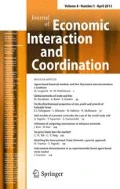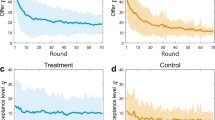Abstract
In this article, we attempt to explain the fair outcome of ultimatum game experiments using the evolutionary dynamics. The players of the game, the proposers and the responders, are randomly matched to play the game. When the responders face low offers from the proposers, their decisions are influenced by not only the monetary payoff but also their feelings. To quantify the responders’ feelings, a degree of dissatisfaction is introduced into the game. Asymmetrical replicator dynamics is used to study the evolution of the proportion of players with different strategies. The solutions of the differential equations exhibit complex outcomes mainly depending on the degree of dissatisfaction. It could also be inferred from our results that people can maintain their rights and interests well when they have a strong sense of unfairness.
Similar content being viewed by others
References
Bolton GE (1991) A comparative model of bargaining: theory and evidence. Am Econ Rev 81: 1096–1136
Bolton GE, Ockenfels A (2000) ERC: A theory of equity, reciprocity, and competition. Am Econ Rev 90: 166–193
Bolton GE, Zwick R (1995) Anonymity versus punishment in ultimatum bargaining. Games Econ Behav 10: 95–121
Brenner T, Vriend NJ (2006) On the behavior of proposers in ultimatum games. J Econ Behav Organ 61: 617–631
Burnell SJ et al (1999) The ultimatum game: optimal strategies without fairness. Games Econ Behav 26: 221–252
Dickinson DL (2000) Ultimatum decision-making: a test of reciprocal kindness. Theory Decis 48: 151–177
Fehr E, Schmidt KM (1999) A theory of fairness, competition, and cooperation. Q J Econ 114: 817–868
Güth W et al (1982) An experimental analysis of ultimatum bargaining. J Econ Behav Organ 3: 367–388
Güth W et al (2001) The relevance of equal splits in ultimatum games. Games Econ Behav 37: 161–169
Güth W, Tietz R (1990) Ultimatum bargaining behavior: a survey and comparison of experimental results. J Econ Psychol 11: 417–449
Hardling R (2007) Fairness evolution in the ultimatum game is a function of reward size. J Theor Biol 246: 720–724
Hoffmann R, Tee J-Y (2006) Adolescent-adult interactions and culture in the ultimatum game. J Econ Psychol 27: 98–116
Kirchsteiger G (1994) The role of envy in ultimatum games. J Econ Behav Organ 25: 373–389
Napel S (2003) Aspiration adaptation in the ultimatum minigame. Games Econ Behav 43: 86–106
Nowak MA et al (2000) Fairness versus Reason in the Ultimatum Game. Science 289: 1773–1775
Page K, Nowak M (2002) Empathy leads to fairness. Bull Math Biol 64: 1101–1116
Page KM, Nowak MA (2001) A generalized adaptive dynamics framework can describe the evolutionary ultimatum game. J Theor Biol 209: 173–179
Page KM et al (2000) The spatial ultimatum game. Proc Biol Sci 267: 2177–2182
Roth AE (1995) Bargaining experiments. In: Kagel J, Roth AE (eds) Handbook of experimental economics. Princeton University Press, Princeton, NJ, pp 253–348
Roth AE et al (1991) Bargaining and market behavior in Jerusalem, Ljubljana, Pittsburgh, and Tokyo: an experimental study. Am Econ Rev 81: 1068–1095
Rubinstein A (1982) Perfect equilibrium in a bargaining model. Econometrica 50: 97–109
Taylor PD (1989) Evolutionary stability in one-parameter models under weak selection. Theor Popul Biol 36: 125–143
Thaler RH (1988) Anomalies: The ultimatum game. J Econ Perspect 2: 195–206
Author information
Authors and Affiliations
Corresponding author
Rights and permissions
About this article
Cite this article
Xie, W., Li, Y., Wang, Y. et al. Responders’ dissatisfaction may provoke fair offer. J Econ Interact Coord 7, 197–207 (2012). https://doi.org/10.1007/s11403-012-0092-7
Received:
Accepted:
Published:
Issue Date:
DOI: https://doi.org/10.1007/s11403-012-0092-7




